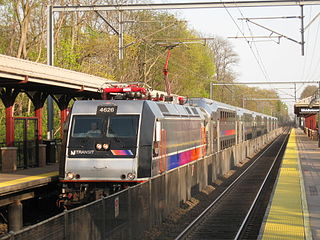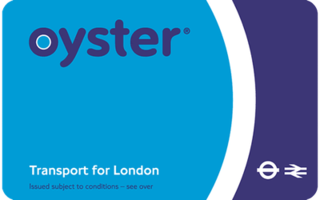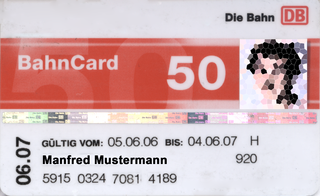
Commuter rail, or suburban rail, is a passenger rail transport service that primarily operates within a metropolitan area, connecting commuters to a central city from adjacent suburbs or commuter towns. Generally commuter rail systems are considered heavy rail, using electrified or diesel trains. Distance charges or zone pricing may be used.

The Deutsche Bahn AG is the national railway company of Germany. Headquartered in the Bahntower in Berlin, it is a joint-stock company (AG). The Federal Republic of Germany is its single shareholder.

London River Services Limited is a division of Transport for London (TfL), which manages passenger transport—leisure-oriented tourist services and commuter services—on the River Thames in London. It does not own or operate any boats itself, but licenses the services of operators.

A rush hour or peak hour is a part of the day during which traffic congestion on roads and crowding on public transport is at its highest. Normally, this happens twice every weekday: once in the morning and once in the afternoon or evening, the times during which the most people commute. The term is often used for a period of peak congestion that may last for more than one hour.

The Oyster card is a payment method for public transport in London in England, United Kingdom. A standard Oyster card is a blue credit-card-sized stored-value contactless smart card. It is promoted by Transport for London (TfL) and can be used on travel modes across London including London Buses, London Underground, the Docklands Light Railway (DLR), London Overground, Tramlink, some river boat services, and most National Rail services within the London fare zones. Since its introduction in June 2003, more than 86 million cards have been used.

The Shanghai Metro (Chinese: 上海地铁; pinyin: Shànghǎi Dìtiě; Shanghainese: Zaon6he5 Di6thiq7) is a rapid transit system in Shanghai, operating urban and suburban transit services to 14 of its 16 municipal districts and to Kunshan, Jiangsu Province. Served as a part of Shanghai rail transit, the Shanghai Metro system is the world's biggest metro system by route length, totaling 802 kilometres (498 mi). It is also the second biggest by the number of stations with 396 stations on 19 lines. It ranks first in the world by annual ridership with 3.88 billion rides delivered in 2019. The daily ridership record was set at 13.29 million on March 8, 2019. Over 10 million people use the system on an average workday.

The Airport Express is one of the lines of the Hong Kong MTR system. It links the urban area with the Hong Kong International Airport and the AsiaWorld–Expo exhibition and convention centre.

MiWay, also known as Mississauga Transit and originally as Mississauga Transit Systems, is the municipal public transport agency serving Mississauga, Ontario, Canada, and is responsible to the city's Transportation and Works Department. MiWay services consists of two types of bus routes: MiLocal, local buses that make frequent stops, and MiExpress, express buses between major destinations. MiWay is the primary operator along the Mississauga Transitway, a dedicated east–west bus-only roadway.

Intermodal passenger transport, also called mixed-mode commuting, involves using two or more modes of transportation in a journey. Mixed-mode commuting is often used to combine the strengths of various transportation options. A major goal of modern intermodal passenger transport is to reduce dependence on the automobile as the major mode of ground transportation and increase use of public transport. To assist the traveller, various intermodal journey planners such as Rome2rio and Google Transit have been devised to help travellers plan and schedule their journey.

The Presto card is a contactless smart card automated fare collection system used on participating public transit systems in the province of Ontario, Canada, specifically in Greater Toronto, Hamilton, and Ottawa. Presto card readers were implemented on a trial basis from 25 June 2007 to 30 September 2008. Full implementation began in November 2009 and it was rolled out across rapid transit stations, railway stations, bus stops and terminals, and transit vehicles on eleven different transit systems.
The Oldham Loop Line was a local railway route in Greater Manchester, England, used by trains that ran from Manchester Victoria to Rochdale via Oldham Mumps. Services on the line at the time of its closure were operated by Northern Rail.

Hooton railway station is situated in the south of the Wirral Peninsula, Cheshire, England. It lies on the Wirral Line 8 miles (13 km) north of Chester and 9+1⁄2 miles (15.3 km) south west of Liverpool Lime Street on the Merseyrail network, and is the junction of the branch from the Chester line to Ellesmere Port. It serves the villages of Hooton and Willaston.

Stourbridge Town is a railway station near the centre of Stourbridge, West Midlands, England. It is situated at the end of a short branch line linking the station with Stourbridge Junction, 0.8 miles away, where passengers can change for mainline train services. It is said to be the shortest operational branch railway line in Europe.
Airline booking ploys are used by travelers in commercial aviation to lower the price of flying by circumventing airlines' rules about how tickets may be used. They are generally a breach of the contract of carriage between the passenger and the airline, which airlines may try to enforce in various ways.
There is no single 'discount railcard' available on the UK railway network. In addition to the large number and variety of short-term or localised promotional fares that have been available to passengers on the British railway network in recent decades, there are many permanent concessionary fare schemes available to passengers. Some of these take the form of Railcards, which can be purchased by people who qualify according to the conditions, and which give discounts for all journeys over a period; other concessions are available for individual journeys. In all cases, details of the type of concession will be printed on the passenger's travel ticket, to distinguish reduced-rate tickets from those sold at the standard full fare.
Fare avoidance, as distinct from fare evasion, is the lawful use of knowledge to travel using tickets which cost significantly less than the 'normal' fare for a given journey, which is what one might be expected to use. It is common in some parts of the world with complex travel networks, notably the National Rail network of Great Britain.

BahnCard is a discount subscription programme offered by Deutsche Bahn (DB), the German national railway company. Unlike airline loyalty programs, but similarly to the UK Railcard, the BahnCard entitles the passenger to a discount price and must be purchased prior to travel. The BahnCard is offered in a non-business and a business version called BahnCard Business. Non-business BahnCard contracts are automatically renewed each year, unless they are cancelled with sufficient notice. Three variants of BahnCard are sold by Deutsche Bahn: The BahnCard 25, the BahnCard 50, and the Mobility BahnCard 100. The first two variants allow passengers to get 25% and 50% discount respectively on standard long-distance rail fares, while the Mobility BahnCard 100 is a type of annual ticket that allows free unlimited travel on most of the German railway network for a fixed price. The (non-business) BahnCard 25/50 are valid for one year and can only be purchased by subscription. If they are not canceled no later than six weeks before the expiry date, their term is automatically extended by another year. BahnCard Business 25/50 are also valid for one year but require no cancellation. Unlike the personal BahnCard, BahnCard Business can be combined with the discount that is granted to large-volume business customers.

The London Cable Car, nicknamed the Dangleway, is a cable car link across the River Thames in London, England. The line was built by Doppelmayr and the total cost was around £60 million. The service opened on 28 June 2012 and is operated by Transport for London (TfL). From its opening the line was sponsored by the airline Emirates, and known as the Emirates Air Line; this sponsorship expired on 28 June 2022. From October 2022, it will be sponsored by the technology firm IFS and it will be known as the IFS Cloud Cable Car.
GO Transit is the inter-regional transportation authority of the Golden Horseshoe, which includes the Greater Toronto and Hamilton Area. It is Canada's oldest regional transit system, first serving passengers in 1967.
Woodhorn was a railway station proposed as part of the project to reintroduce passenger rail services onto the Ashington, Blyth & Tyne Railway which closed to passenger traffic in 1964. It was initially proposed that the newly reopened line could terminate at a new station, close to the Woodhorn Colliery Museum and Northumberland Archives, rather than at Ashington, the previous station however revised plans, released in July 2019 appear to have dropped Woodhorn station from project scope.













